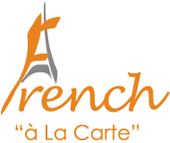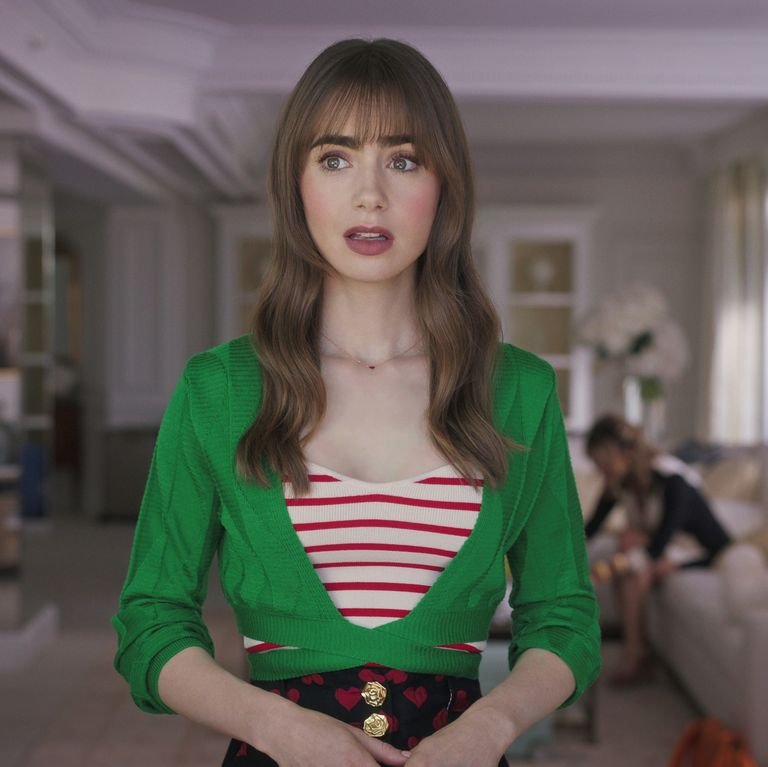Learn French With Emily in Paris Season 3 Episodes 6,7
By watching Emily in Paris, French learners like you can pick up new expressions, pronunciation tips, and vocabulary. There are actually a lot of useful linguistic points if you are learning French.
This week we will be exploring some French quotes from episodes 6,7
Every week French à La Carte analyze new episodes at a time, up until episode number 10 (the final episode of season 3). Let’s dive in!
Emily in Paris season 3 in French: Which version to choose
If your French level is intermediate or advanced, my first recommendation is to watch the show in French. Emily and Mindy frequently intersperse English words and expressions with French, but we still encourage you to choose the French version.
However, be careful with the French subtitles which don’t really reflect the dialogues very well. So if you can, try not to turn on the subtitles unless you would like to confirm the meaning of a scene or if you think you have missed something.
If your level of French is beginner or elementary, watching the show in French will be too hard for you and it is more accessible to watch it in English, but do try to pick up French words or expressions.
Although the majority of the show is spoken in English, most of the cast is actually French and they speak French in a realistic and normal manner.
Spoken French expressions & French slang : Episode 6
28.13 - Sylvie to Emily encouraging her to enjoy her free afternoon in Provence :
« Va te balader »
Se balader is a spoken French expression that means to go for a walk. It is less formal than se promener.
27.29 - Sylvie to Katherine regarding the bedroom change in her house in Provence :
« Bien-sûr je vais me débrouiller » - « Of course I will manage »
The reflexive verb se débrouiller doesn't have an exact translation in English as you can hear it used in all kinds of ways in French conversation, meaning sometimes completely different things.
The most common meaning of the reflexive verb se débrouiller is to fend for yourself, to get by or to manage.
18.04 - Camille to Sofia regarding her relationship with Gabriel:
« Je tiens à lui »
The verb tenir à, can be used for a person or for an object.
Tenir à quelque chose: to cherish something
Tenir à quelqu’un means to care about someone. It can be used in a romantic way just like in the context of the relationship between Gabriel and Camille.
When Camille says Je tiens à lui, this sentence is translated to I care about him.
13.24 - Laurent to Sylvie who is surprised to see him arriving:
« Je croyais que tu étais au courant » - « I thought that you were aware that I was coming »
Etre au courant is a spoken French expression that means to be aware of something or to be informed of something.
There is another expression in French with Au courant which is tenir au courant quelqu’un: to let someone know something/to keep them updated
For instance « Je te tiens au courant » means « I will keep you posted, I will let you know »
12.45 - Laurent to Sylvie about the fact that Eric settled in her apartment:
« D’abord, il squatte ton appartement et maintenant ça » - « First he crashes your flat and now this »
The slang verb squatter is usually used when an unused building is occupied without having a legal right to do so and without paying. It can be translated by to crash a place.
With this sentence, we understand that Laurent is jealous that Sylvie’s lover partly lives with her.
4.48 - Antoine who just bought a new Mc Laren car gives a definition of luxury quoting Coco Chanel :
« Le luxe est une nécessité qui commence là où finit la nécessité » Chanel.
Quoting Chanel Antoine justifies himself for having bought a luxury car and for having increased the expenses of the Lavaux company.
This quote from Chanel can be translated by « Luxury begins where the needs ends».
Spoken French expressions & French slang : Episode 7
26.39 - Mindy to Emily regarding Nicolas’s text sent to Mindy offering her to join Nicolas and his friends to an open-air screening:
« On va voir un film en plein air avec des potes, est-ce que tu viens? » - « A group of us are going to an outdoor film, want to join? »
Un pote: a buddy, a friend in slang French.
15.26 - Nicolas to Mindy regarding Pierre Cadault and the opening of his new boutique:
« Il voulait du bling bling tape à l’œil, c’est ce qu’on lui a fait » - « He wanted something flashy, that’s what we actually did »
These two spoken French expressions in this sentence Bling-bling and Tape à l’oeil have a close meaning, they mean flashy.
Being bling-bling is a French expression with an onomatopoeic origin and comes from the vocabulary of black American rappers. Bling-bling designs the noise made by the clashing of the jewels that rappers wear.
Another French expression is être paillettes, literally translated as to be sequin which doesn’t make any sense ! It is usually used in a negative way to speak about someone who likes flashy things. It stigmatizes not only its vulgarity but implies a judgment and drops the ax of a condemnation for lack of emptiness and content.
14.30 - Mindy to Emily regarding the open-air movies at the parc de la Villette which is up to her the best place to flirt as movies are screened in the dark:
« Un de ses amis m’a dit que c’était un coin hyper connu pour pêcho » - « One of them told me that it is a notorious hook-up spot »
Pêcho is a slang verb derived from pêcher to fish in French. Mindy means here that the open-air movies at la Villette represent a great opportunity to catch girls and flirt with them.
13.16 - The girl who is trying to flirt with Gabriel to Emily during the screening of the open-air movie. Talking about Gabriel she says:
« Il s’en fout du film » - « He doesn’t care about the movie »
S’en foutre is slang French and means not to care about something.
Most of the time, the verb foutre can be replaced by ficher to make it a bit more colloquial… Je m’en fiche: I don’t care.
13.03 - The girl who tries to flirt with Gabriel to Emily and him (she doesn’t understand if they are in a relationship ):
« Vous êtes amis pendant que ta meuf est en Grèce ?» - « You are good friends whilst your girlfriend is in Greece? »
Une meuf: is a slang word in verlan words that has become a part of everyday French more than others, and meuf is certainly one of them.
Meuf is a verlan word, meaning that it is formed by inverting another word's syllables.
In this case, that word is femme which is turned into meuf as follows: fe – mme => me – fe => meuf.
Meuf is the equivalent of saying woman, girl and is often used to describe a woman who is sexually desirable.
9.20 - Nicolas to Mindy regarding her outfit in red latex:
« Tu as un look incroyable, tous les mecs te mataient » - « You look incredibly stylish and all the guys were staring at you »
In this sentence there are two slang words: les mecs and the verb mater.
Un mec: guy
Mater: to stare at someone. It is used in the sense of a sexual attraction.
8.13 - Nicolas to Mindy when his mobile vibrates as Pierre Cadault is trying to reach him on his mobile:
« C’est un boulet ce mec » Literally it means « It’s a cannonball this guy »
Un boulet : a drag in slang French.



